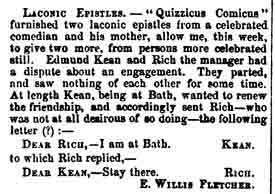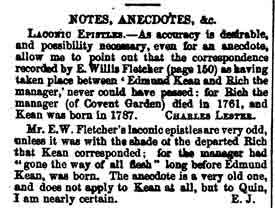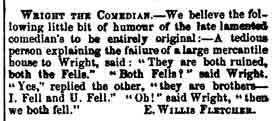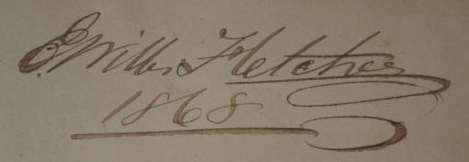 |
|||
Edward Willis Fletcher was born October 5, 1842 in Bryanston Square, Westminster, London, England a son of Robert (1817 - 1912) and Rachel (1815 - ) Fletcher. 1 By 1861 he had established himself at the age of nineteen as an artificial florist. On September 29 of that year he married Harriett Emma Handley (1837-1902) a daughter of soldier, William Handley.2 Harriet and her sister, Selina, had both worked as artificial florists as children. During the next ten years he built his business in Finsbury, Islington to employ "4 boys, 1 man and 6 females." At the same time the couple's family grew to include four children: Amy, Edward Robert, Ivy, and Mildred.3 |
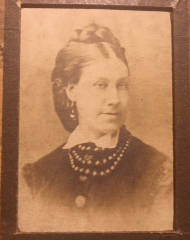 Harriett Handley Fletcher |
||
Nothing is known of his musical training or his interest in the horn, however in 1868 at the age of twenty-six he began compiling the manuscript of horn excerpts from symphonies, oratorios shown here. 4 In it he records that he played a "Sextette of Haydn's for Winds" in F. for two clarinets, two bassoons and two horns in December, 1873. The soiree took place at Dr. Stone's house in Dean's Yard, Westminster. The other players listed by Mr. Fletcher were Lazarus, Beddome, Hutchins, Dr Stone, and Mr. Hanart [sic, Hanhart]. 5 |
|||
 |
|||
The contents of the manuscript represent an eclectic mix of repertoire performed in London in the nineteenth century. Popular opera composers such as Rossini, Bellini, Gounod, Weber, Auber, and Balfe are well represented. Symphonic works are limited to Beethoven, Mozart and Haydn. Contemporary British composers such as Cipriani Potter, George Alexander Macfarren, George Herbert Rodwell, and Alexander Lee are also present. In addition thee are numerous transcriptions for horn of opera arias and popular songs of the day, a few etudes and duets, including one by Giovanni Puzzi. 6 |
|||
In addition to the horn, Mr.. Fletcher had an interest in music for the voice. In August 1861 (a month before his marriage to Harriett Handley) he published lyrics for a song, "His Eyes" in The Musical World (see right). This song attracted the attention of one reader, who requested his address. Subsequently, Mr. Fletcher offered to send it to either of two publishers. An anthem, "Rejoice in the Lord" was published by The London Music Publishers (bottom right). In 1870 Mr. Fletcher's comment to the Sunday Times regarding the use of secular tunes in sacred music caught the eye of an editor of Notes and Queries: |
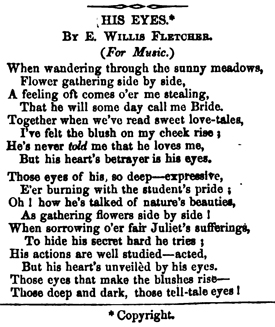 The Musical World, August 17, 1861  The Musical World, October 19, 1861 The Musical World, November 23, 1861 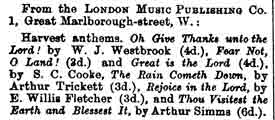 The Literary World, February 12, 1892 |
||
|
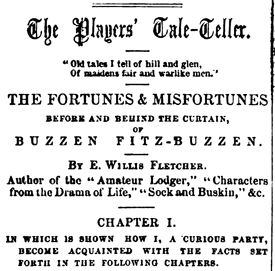 The Players, April 12, 1860 |
||
Two weeks later, apparently satisfied with his writing skills, The Players published the first of eleven chapters of his novelette "The Fortunes and Misfortunes Before and Behind the Curtain or Buzzen Fitz-Buzzen" (see above right). In this story two gentlemen, one younger (Mr. Charles Buzzen) the other substantially older (Mr. Joshua Merry) are clerks in a law firm and have in common an affinity for the theater. Taking lunch alone at a local restaurant one day, Buzzen overhears three other young gentlemen "of a very showy and attractive appearance" discussing a disastrous performance of Macbeth by one of their other friends, that one of them had witnessed the night before. Buzzen joins in the conversation, and afterwards confides to Mr. Merry that he has aspirations to the stage himself, hoping someday to play Othello. Mr. Merry says he knows the men at lunch and can make some connections for him. They agree to meet later that evening, however Mr. Merry is delayed due, as he explains later, to encounters with his landlady and his washer woman who are among his several creditors. They proceed to the "Merry Wives of Windsor", a bar in Covent Garden frequented by amateur actors. In the Club Room Mr. Buzzen is introduced to the '"Thespian Trumps'", an amateur thespian society where he recognizes two of the men he had met at lunch. He is elected as a member to the Society by unanimous vote and then to his delight is offered a double role in the following week's performance of Beauty of the Village. Out of gratitude for his assistance he loans Mr. Merry some money to pay his debts and hopes someday to introduce him to his wealthy maiden aunt. For some time Mr. Buzzen has been enamored of Miss Letitia Primrose, age 18, and he now becomes nervous about his first appearance on the stage, especially since it will require him to kiss the lovely maid, "Becky", in front of Letty and her mother who are expected to be present in the audience. He explains to her that the kiss is required in the script, but she strictly forbids it. She finally consents "after a time and much persuasion, coupled with a promise of a new pair of mauve or magenta colour gloves."7 |
|||
|
|||
|
|||
|
|
|||
Edward Robert Fletcher, son of Edward Willis and Harriett Fletcher, was born June 15, 1868 in Pimlico. He became an accomplished organist, conductor, and horn player. In 1900 he was admitted to the Royal Society of Musicians of Great Britain. He described his occupation as "music master in genteral." He was an organist for five years at "Spa Fields", Islington, and also taught piano. For three years he performed as second horn at the St. James' Theatre. and also played in the Sunday League Orchestra and on the Harrison concert tour. In 1926 he was listed as "E.W. Fletcher" (his father's initials) in the "French Horn" section of the Musicians Union (London Branch) membership book, residing at 49 Rosebank Avenue, Harrow. In addition he served as conductor of the Opera Company on tour. As a concert organizer he became good friends with ballerina Anna Pavlova and her musical director, Theodore Stier. He also contracted the orchestra for the 1924 Italian Ballet at Covent Garden. |
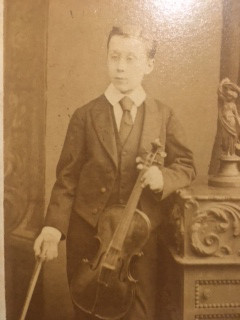 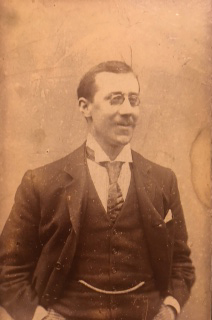 |
||
| |
|||
